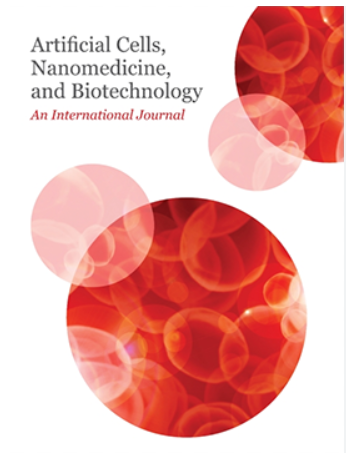Ultrasound-sensitive cRGD-modified liposomes as a novel drug delivery system
IF 4.5
3区 生物学
Q1 BIOTECHNOLOGY & APPLIED MICROBIOLOGY
Artificial Cells, Nanomedicine, and Biotechnology
Pub Date : 2022-05-11
DOI:10.1080/21691401.2022.2074439
引用次数: 7
Abstract
Abstract Targeted liposomes enable the delivery of encapsulated chemotherapeutics to tumours by targeting specific receptors overexpressed on the surfaces of cancer cells; this helps in reducing the systemic side effects associated with the cytotoxic agents. Upon reaching the targeted site, these liposomes can be triggered to release their payloads using internal or external triggers. In this study, we investigate the use of low-frequency ultrasound as an external modality to trigger the release of a model drug (calcein) from non-targeted and targeted pegylated liposomes modified with cyclic arginine–glycine–aspartate (cRGD). Liposomes were exposed to sonication at 20-kHz using three different power densities (6.2, 9, and 10 mW/cm2). Our results showed that increasing the power density increased calcein release from the sonicated liposomes. Moreover, cRGD conjugation to the surface of the liposomes rendered cRGD-liposomes more susceptible to ultrasound compared to the non-targeted liposomes. cRGD conjugation was also found to increase cellular uptake of calcein by human colorectal carcinoma (HCT116) cells which were further enhanced following sonicating the cells with low-frequency ultrasound (LFUS).超声敏感的crgd修饰脂质体作为一种新型给药系统
靶向脂质体通过靶向癌细胞表面过度表达的特异性受体,使包膜化疗药物能够递送到肿瘤;这有助于减少与细胞毒性药物相关的全身副作用。到达目标位点后,这些脂质体可以通过内部或外部触发触发释放其有效载荷。在这项研究中,我们研究了使用低频超声作为外部方式来触发由环精氨酸-甘氨酸-天冬氨酸(cRGD)修饰的非靶向和靶向聚乙二醇化脂质体释放模型药物(钙黄蛋白)。脂质体暴露于20 khz的超声波中,使用三种不同的功率密度(6.2、9和10 mW/cm2)。结果表明,功率密度的增加增加了超声脂质体中钙黄蛋白的释放。此外,与非靶向脂质体相比,cRGD与脂质体表面的结合使cRGD脂质体更容易受到超声的影响。研究还发现,cRGD偶联可以增加人类结直肠癌(HCT116)细胞对钙黄蛋白的吸收,这种吸收在低频超声(LFUS)下进一步增强。
本文章由计算机程序翻译,如有差异,请以英文原文为准。
求助全文
约1分钟内获得全文
求助全文
来源期刊

Artificial Cells, Nanomedicine, and Biotechnology
BIOTECHNOLOGY & APPLIED MICROBIOLOGY-ENGINEERING, BIOMEDICAL
CiteScore
10.90
自引率
0.00%
发文量
48
审稿时长
20 weeks
期刊介绍:
Artificial Cells, Nanomedicine and Biotechnology covers the frontiers of interdisciplinary research and application, combining artificial cells, nanotechnology, nanobiotechnology, biotechnology, molecular biology, bioencapsulation, novel carriers, stem cells and tissue engineering. Emphasis is on basic research, applied research, and clinical and industrial applications of the following topics:artificial cellsblood substitutes and oxygen therapeuticsnanotechnology, nanobiotecnology, nanomedicinetissue engineeringstem cellsbioencapsulationmicroencapsulation and nanoencapsulationmicroparticles and nanoparticlesliposomescell therapy and gene therapyenzyme therapydrug delivery systemsbiodegradable and biocompatible polymers for scaffolds and carriersbiosensorsimmobilized enzymes and their usesother biotechnological and nanobiotechnological approachesRapid progress in modern research cannot be carried out in isolation and is based on the combined use of the different novel approaches. The interdisciplinary research involving novel approaches, as discussed above, has revolutionized this field resulting in rapid developments. This journal serves to bring these different, modern and futuristic approaches together for the academic, clinical and industrial communities to allow for even greater developments of this highly interdisciplinary area.
 求助内容:
求助内容: 应助结果提醒方式:
应助结果提醒方式:


